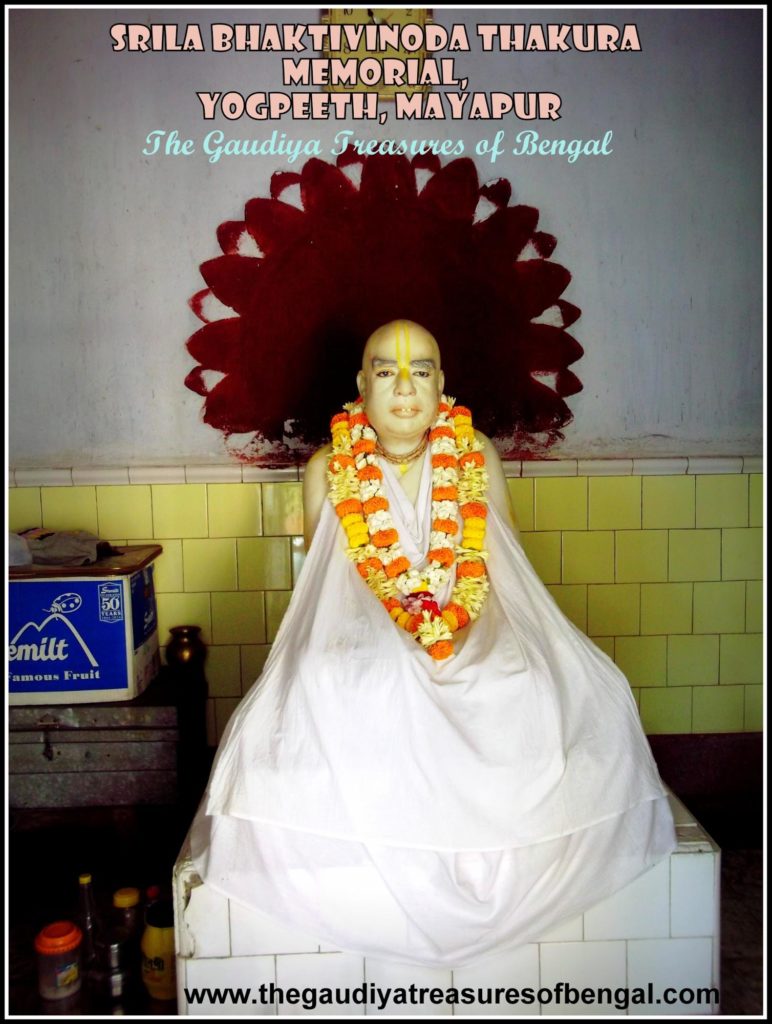
Sri Saccidananda Bhaktivinoda Thakur, who is sometimes also referred to as the seventh Goswami, is an eternal associate of the Supreme Lord. His contribution to the Brahma-Madhva Gaudiya Sampradaya is invaluable.At a time when the science of pure devotional service (Bhakti) had almost become lost due to the cultural and religious chauvinism of the ruling British, and the essence of Vaishnavism largely discredited due to the perverted actions and lifestyles of a few non bonafide Vaishnava sects, Srila Bhaktivinoda was largely responsible for rescuing and unearthing the timeless teachings of Sri Caitanya Mahaprabhu. In Fact it was he who ,after conducting a painstaking research, had rediscovered the long lost birthsite of Sri Gaurasundara (refer – ‘YogPeeth, Mayapur, Navadvipa – The birthplace of Sri Caitanya Mahaprabhu’). Srila Bhaktivinoda Thakur, was not only a magistrate, but also a renowned and recognised scholar in his days, with vast knowledge in english,bengali,hindi,oriya and sanskrit.He was also a member of the royal asiatic society of London. Such was the degraded state of affairs during those days, that Srila Bhaktivinoda Thakur could not find a bonafide copy of Sri Caitanya Caritamrta, the most important literature for understanding Lord Caitanya’s life and teachings, anywhere. It was only after several enquiries and a long wait, that he received a copy of this book. He subsequently published it along with his commentaries (Amrta-pravaha-bhasya). Likewise, he was instrumental in unearthing several ancient manuscripts like Caitanyopanishad ( portion of Atharva Veda) ,Sri Krishna Vijaya, etc.We consider ourselves insignificant servants of Srila Bhaktivinoda Thakur, whose causeless mercy has enabled us fools to get a glimpse of his elevated stature and pen a few lines in his glorification.
Books written by Bhaktivinoda Thakur
Svananda Sukhada Kunja & Surabhi Kunja are the eternal residences of Srila Bhaktivinoda Thakur. Both of these houses are located upon the bank of the Ganges,at Godrumadvipa (one of the nine islands of Navadvipa). Srila Bhaktivinoda Thakur had stayed here for many years, serving and performing his bhajana. He initially set up his residence at Surabhi Kunja before moving further down the road to Svananda Sukhada Kunja. Most of his important works have been composed and published while he resided at Godruma. Sri Harinama Cintamani, Navadvipa Dham Mahatmya, Bhagavatarka marichi mala (Sri Svarupa Damodara, an intimate associate of Mahaprabhu instructed the thakur in his trance to compose this book) ,Bhajana Rahasya, Vedarka Didhiti (a sanskrit commentary on Isopanisad), Sva niyama dasakam(twelve verses of self imposed regulative principles) ,Jaiva Dharma,Saranagati, Sri Navadvipa Bhava Taranga, Amrta Pravaha Bhasya,translations of Sankalpa Kalpadruma, sat-kriya-sara-dipika (purificatory rites, originally written in sanskrit by Gopal Bhatta Goswami),Prema-Vivarta (a work by Jagadananda Pandita),commentary on Sri Krishna Karnamrita, etc to mention a few. The other renowned works of the Thakur include Sri Caitanya Mahaprabhu – His life and Precepts,Sri Bhajanamrita, Hari Bhakti Kalpa Latika,etc. It is a mystery how Srila Bhaktivinoda could balance his heavy official duties , spend time with family and yet write so much.Of Course nothing is impossible for an empowered incarnation of the Lord.
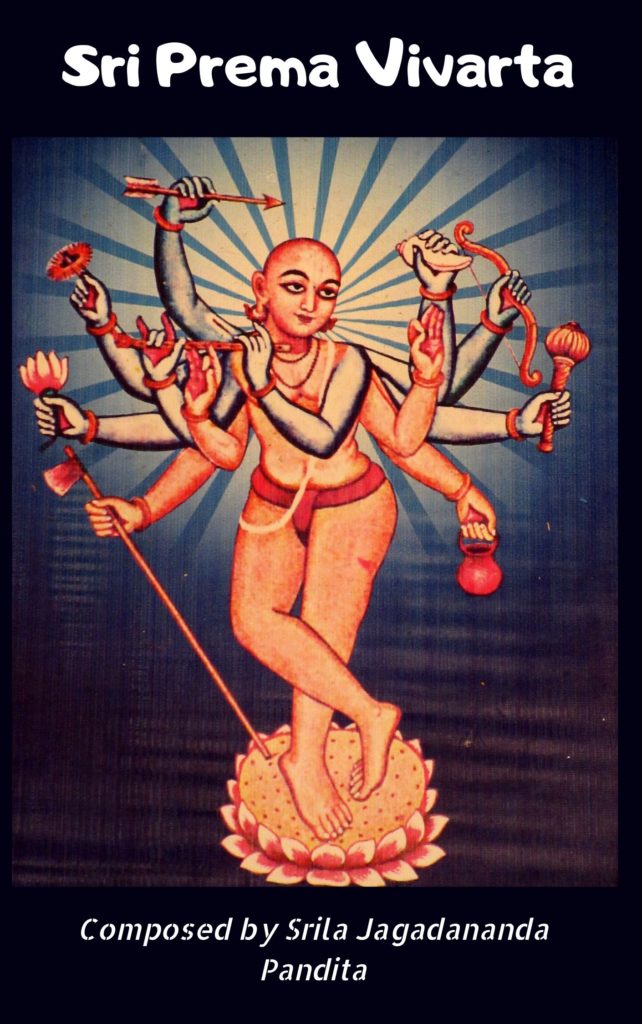
Birth and Early childhood of Bhaktivinoda Thakur :
Sri Kedarnath Datta, who came to be subsequently known as Bhaktivinoda Thakur, was born on 2nd of september, 1838 AD in the ancient village of Birnagar, situated in Ula (Nadiya District). Kedarnath was born of rich and illustrious parents, Sri Ananda Chandra Datta and Jagat Mohini Devi. In his book Datta-vamsa-mala, Srila Bhaktivinoda explains that he was born into a family who had descended from Purushottama Datta, foremost of the five renowned kayasthas who had come to the Gauda region on invitation of the king Adisura.His family lineage has also been graced by the birth of the great vaishnava acharya Sri Narottama Das Thakur, whose devotional compositions are glorified all over the three worlds.Sri Govinda-sarana Datta ,one of the cousins of Narottama Das Thakur, was once granted a huge piece of land on the bank of the Ganges, by the sultan of Delhi.This piece of land was named after him and came to be known as Govindapur.It was this land of Govindapur that was later merged with Sutanuti and kolikata, to form the modern city of Calcutta (kolkata) as we know today. Such is the great lineage of our dear thakur.
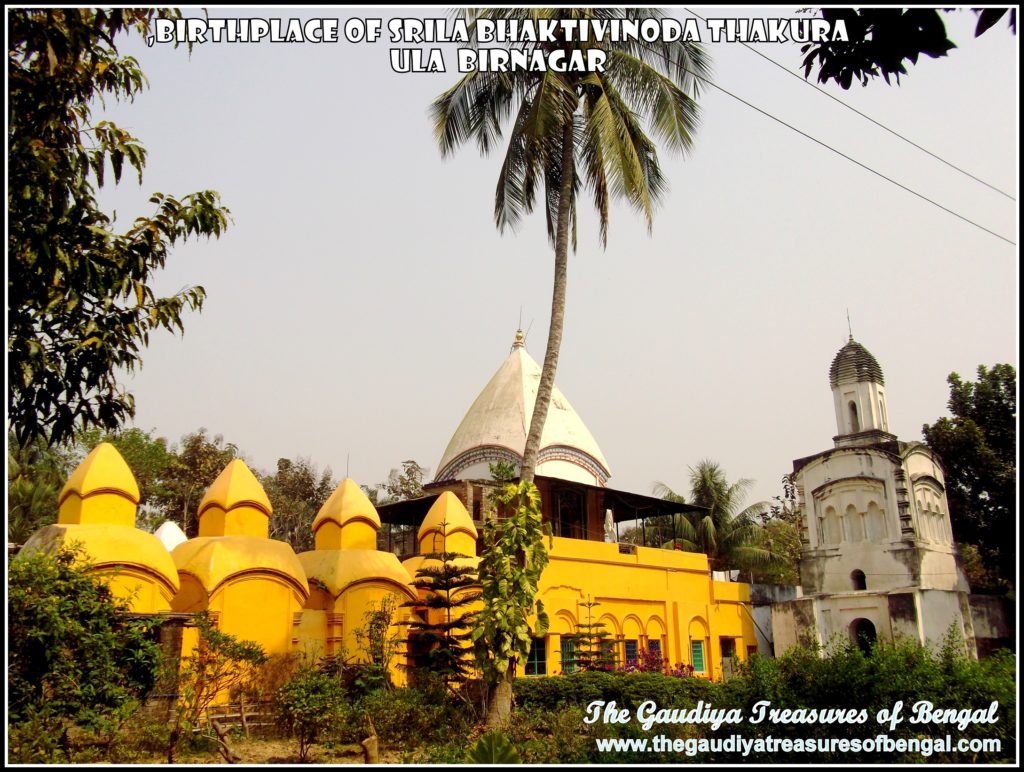
Srila Bhaktivinoda Thakur attended his first school on the lawn of his maternal grandfather’s opulent residence. The teacher Kartika Sarkar was very strict and used to beat the students with his cane.The place where all the students used to gather for education was otherwise utilised for performing different religious ceremonies all throughout the year. Srila Bhaktivinoda here mentions that his maternal relatives were mainly shaktas and hence they mostly worshipped Durga Devi or her other manifestations like goddess Jagaddhatri, Sitala ,etc. (refer – ‘Ula Birnagar – The Birthplace of Srila Bhaktivinoda Thakur’).Srila Bhaktivinoda recounts in his biography, that during festivals,there even used to be sacrifices of goats and buffaloes that took place here ,at his maternal grandfather’s house.
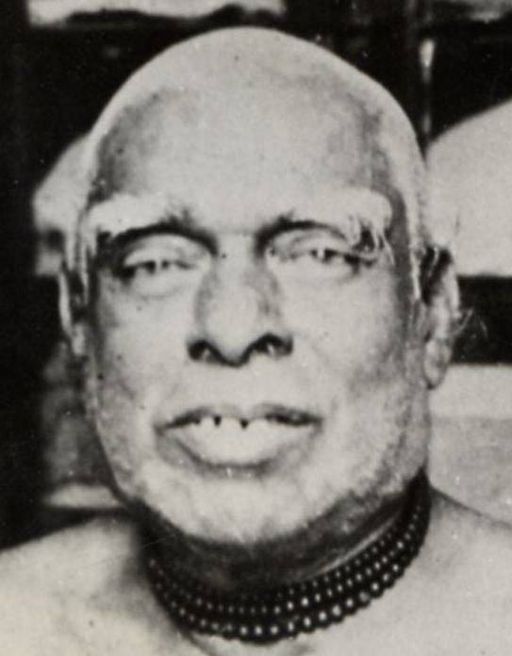
Then he joined a bengali medium school where he studied upto class six. Srila Bhaktivinoda recounts that the teacher was just as strict and cruel as Yamaraja and the other senior students of the school just like Yamadutas. Thereafter he joined an english medium school which had opened again at his maternal grandfather’s home, where a frenchman named Dijor Baret imparted english lessons unto his students.At the age of seven Srila Bhaktivinoda ,along with his brother, was admitted into the school run by the king of Krishnanagar, wherein the sons of all the prominent people from the neighbouring areas were invited to study. The classes were held at Krishnanagar , where they both stayed, and palanquins were arranged to carry them back to Ula on the weekends.Srila Bhaktivinoda excelled in his studies and received a class promotion and scholarship. But after the sudden demise of Kaliprasanna, his elder brother due to cholera, he left this school and joined another one at Ula itself. The Thakura didn’t mind this and was actually very happy to study from home.
The Thakura was very inquisitive since his very childhood.He liked to spend his time talking to the gatekeepers, who used to recite to him stories from the Ramayana and Mahabharata. The Thakura’s maternal grandfather ,Mustaphi Mahasaya, was very rich. His grand residence housed a beautiful temple of Sri Radha krishna, a huge temple of Maa Durga (with 9 peaks), a temple of Maa Kali (with 5 peaks) and 10 separate temples of Lord Shiva. Mustaphi Mahasaya had employed 56 gatekeepers to guard the village.On certain festivals, buffalo-elephant fights were organised. The buffaloes had their horns tipped with iron. Similarly the elephants also had their tusks tipped.The elephants would win at times, and sometimes the buffaloes would win.The village was a very happy place and no one lacked anything. If anybody was in need, he would simply seek for help from Mustaphi Mahasaya.
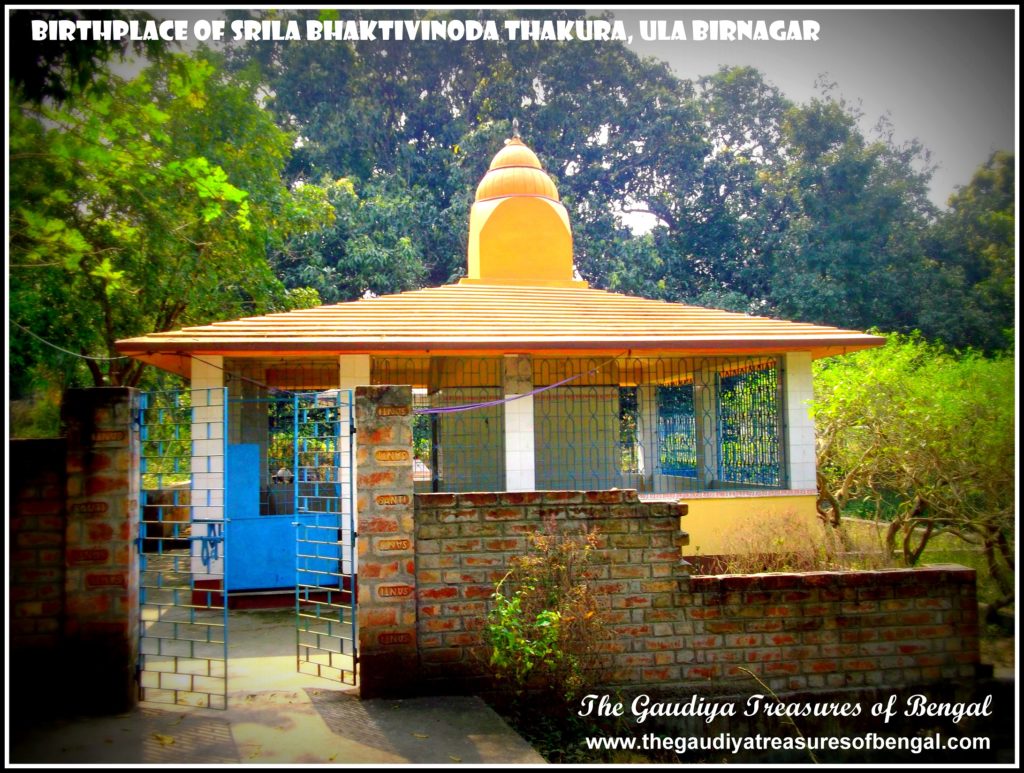
A few years down the line, the opulences of his family gradually declined. His maternal grandfather lost all of his wealth and similar was the fate of his paternal grandfather as well. They slowly lost all their properties,money and grandeur. When he was just 11 years old, his father left his body and Bhaktivinoda was now all alone in this world with his mother. Since his very childhood Bhaktivinoda thakur was very inquisitive regarding the creation and the world around. He questioned who he was, and what was the purpose of life.He was deeply inclined to understand the philosophical conclusions of learned men, who tried to convince him as per their own realizations.
Srila Bhaktivinoda Thakur in his youth :
After his father had passed away, and the fortunes of his family had drastically declined, life was not very easy for the Thakura. At the age of 12 his mother arranged his marriage with a five year old girl named Sayamani who was a resident of Ranaghat. In those days child marriage was a common norm. It didn’t necessarily mean that the little girl had to move into the house of the in-laws immediately after her marriage. She could actually wait until she had grown up and matured enough to take up the responsibilities.In this way the child felt that she was secured ,her future was arranged and her protection guaranteed.The marriage of the Thakura was performed with great pomp and show.
On the suggestion of Kashi Prasad Ghosh,the famous bengali poet and his maternal uncle, Srila Bhaktivinoda then left Ula and came over to Calcutta for his studies.He lived with his uncle and aunt here at North Kolkata.The house was situated adjacent to the swimming pool Heduya.He was then enrolled into the Hindu Charitable school where he studied for four years. The Thakura excelled in his studies.During his stay in Calcutta, Srila Bhaktivinoda became close to eminent personalities like Dwijendranath Tagore ,Satyendranath Tagore,Krishna Das Pal, Tarak Nath Palit ,etc. who went onto become famous in different spheres of life. Though many of these intellectuals during those days were practitioners of the Brahmo Samaj (the spiritual faith heralded by Raja Ram Mohan Roy), the Thakura never bought into it. From the very beginning he viewed the Supreme Lord as a person with whom he could exchange loving reciprocations.
Subsequently he got admitted into the Calcutta university where his philosophical knowledge, oratory and debating skills amazed one and all. The great Iswara chandra Vidyasagar was one of his teachers during these days. Just to provide a glimpse of the Thakura’s intellectualism, it is worthwhile mentioning the subject upon which he once chose to speak while in college – ‘The evolution of matter through the material mode of Goodness’.
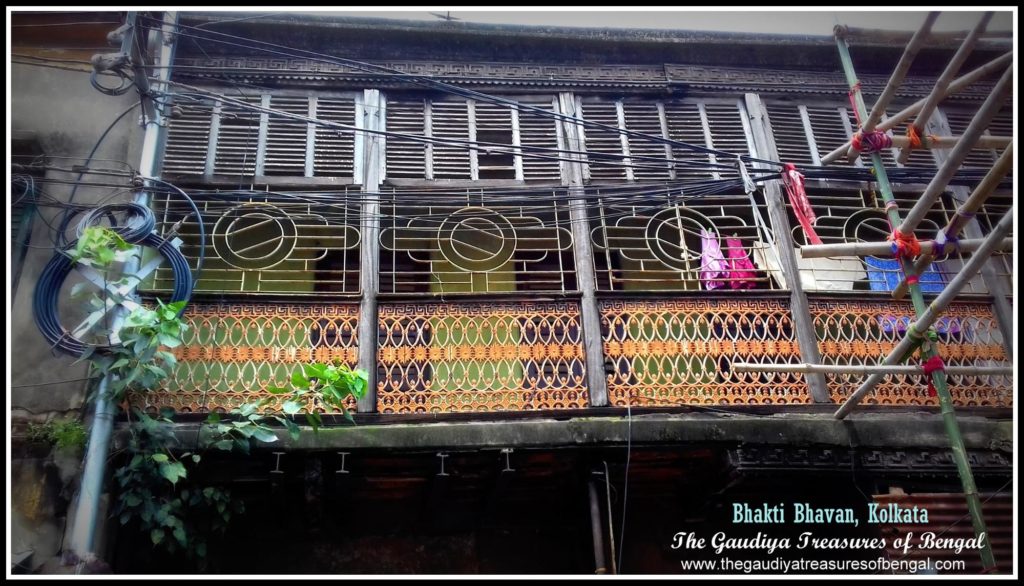
Meanwhile, an epidemic struck the town of Ula killing people in hundreds. The whole town of Ula became almost deserted owing to this epidemic and the Thakura’s sister also passed away during this time. Srila Bhaktivinoda rescued his mother and grandmother and brought them over to stay with him in Calcutta.The Thakura went through a very bad phase of financial crisis during this time.His maternal grandmother and his paternal grandfather, soon passed away. The Thakura’s mother had to frequently sell off her Gold ornaments to manage the expenses. Not much help came in from the relatives during these harsh times.Srila Bhaktivinoda receiving an offer of employment,then shifted to Orissa. There he taught in a school receiving a monthly salary of Rs 45 per month. His son Annada was born in the year 1860.A few months after the child was born ,Sayamani devi passed away entrusting the young child in the care of his father.The Thakura then shifted to Midnapur becoming a school teacher.However he didn’t find the atmosphere in Midnapur too conducive to spirituality as here there was much strife between the hindus and the members of the Brahmo Samaj.
Srila Bhaktivinoda Thakur remarried, and his bride was Srimati Bhagavati Devi,the daughter of Ganya Manya Ray from Jakpur. Thereafter the Thakura accepted a job as a tax collector and a clerk in the collectorate.A few years down the line, he became the clerk at the Judge’s court in Chuadanga. His salary was then 150 rs per month.At the age of 27, the Thakura was appointed Deputy Registrar at Chapra, where he also had the powers of Deputy Magistrate and Deputy Collector.Things were showing up.He then passed a government examination, as a result of which he got promoted to the position of Sub Registrar of Assurances in the districts of Purnia and Kishanganj (districts of Bihar).
The Bhagavat: Its Philosophy, Its Ethics and Its Theology
Inspite of going through such utter crisis, the Thakura remained steadfast and fearlessly went about his mission. His life is an inspiration and example for all of us to follow. While the Thakura was employed as the Deputy Magistrate of Dinajpur, he enjoyed the priceless association of elevated Vaishnavas.The zamindar of Dinajpur was a descendent of Ramananda Vasu, an associate of Lord Caitanya, and Vaishnavism flourished under the King’s patronage.During this time, Srila Bhaktivinoda deeply studied the prominent scriptures – Srimad Bhagavatam ,Sri Caitanya Caritamrta and other books revealing Krishna Tattva. He now understood without doubt that Lord Caitanya was none other than the Supreme Personality of Godhead.Actually it was not necessary for Srila Bhaktivinoda to read Sri Caitanya Caritamrta to understand the identity of his eternal lord, Sri Caitanya Mahaprabhu. He is an eternal servant of the Lord and the Lord had sent him to revive His movement. The liberated souls sometimes perform such actions so that common men like us can relate with their examples.Srila Bhaktivinoda mentions in his autobiography, that from the very beginning of his contact with Mahaprabhu’s teachings, he felt a spontaneous devotion towards Him.
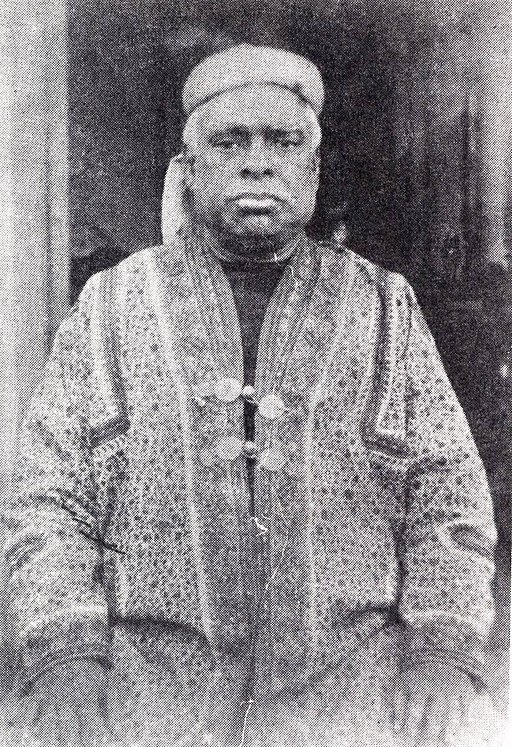
While in Dinajpur, Srila Bhaktivinoda, out of his ecstatic love for Mahaprabhu composed a beautiful poem known as Sac-Cid-ananda-premalankara. From this time on, the thakura became renowned as Saci-cid-ananda Bhaktivinoda.It was during his days at Dinajpur, while the tensions between the Hindus and the members of Brahmo Samaj soared high, that he gave a mesmerizing speech on science of krishna consciousness.Here he stressed how true spirituality was above the petty sectarian strifes of the masses.He glorified Srimad Bhagavatam and the deep essence of Lord Caitanya’s movement.The speech later took the form of a famous book – The Bhagavat: Its Philosophy, Its Ethics and Its Theology.
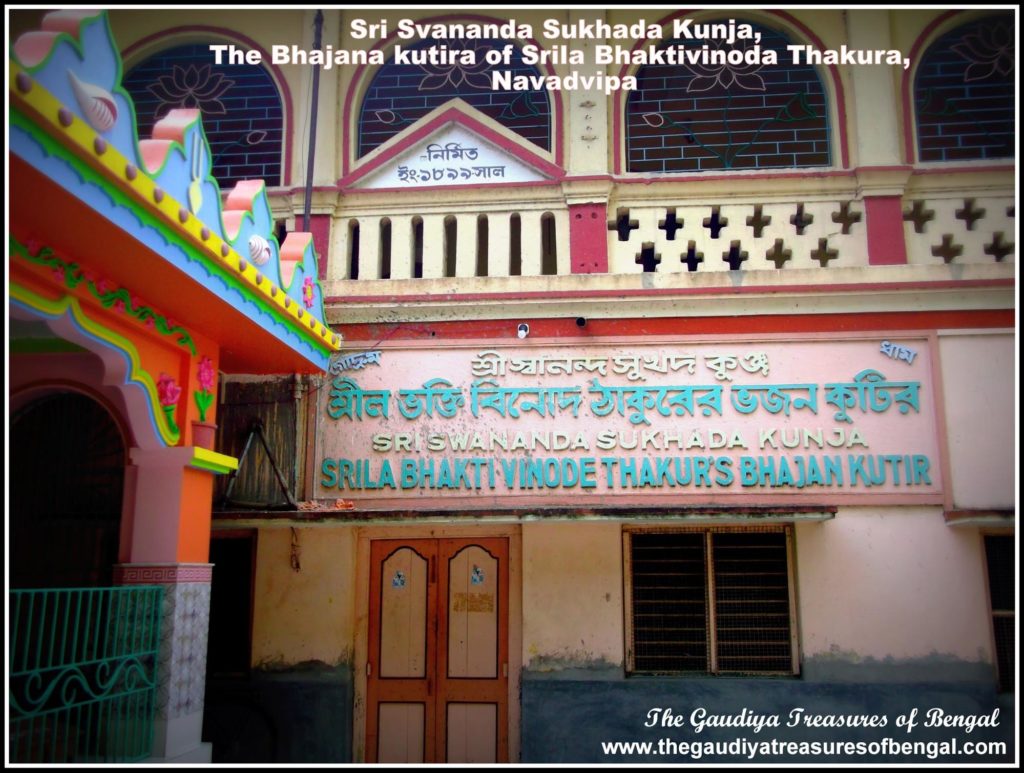
Thereafter the Thakura got transferred to Puri and he utilised this opportunity to visit all the holy places, where Lord Caitanya and His associates had performed their pastimes.It was in Orissa that the Thakura got association of paramhamsas such as Gaur Kishor Das babaji and Svarupa Das babaji.Srila Gaura Kishor Das Babaji considered Bhaktivinoda thakur his siksa Guru.Here in Puri, the thakura resumed learning Sanskrit and attained mastery over it.Srimad Bhagavatam, Sat sandarbha, Govinda Bhasya, Bhakti Rasamrita Sindhu,Hari Bhakti Kalpa Latika, were some of the books he went through during his time here.Srila Bhaktivinoda would sit beside the temple of Lord Jagannatha everyday and recite Srimad Bhagavatam at length.The Thakura also spent long hours discussing the pastimes of Krishna at the prominent holy sites of Tota Gopinatha temple, the samadhi of Haridasa Thakura, Gambhira, etc
The Chastisement of the Mystic Bisak Sen
While in Puri the Thakura faced many challenges.There was an imposter ,named Bisak sen, belonging to the Ati-bari sect (a non bonafide religious group of pseudo devotees) who claimed himself to be an incarnation of Mahavishnu (the Lord lying in the causal ocean). He possessed some mystic powers that he had obtained by performing some austerities, and he used them to fool the local people. He could cure some incurable diseases, could emit fire from his matted hair, read others’ minds ,etc. Now the scriptures clearly state that there are eight yogic siddhis, which can be achieved by one’s performance of suitable yogic processes.But it does not imply that anyone possessing these siddhis becomes God. The imposter had actually organised a Rasa Lila and sexually exploited the wives of others. When the local people complained, the British Government handed over the case to Srila Bhaktivinoda. The Thakura first tried to explain the fool his insignificant position and his relationship with the Supreme Lord.Bisak Sen laughed at the Thakura’s words and even passed derogatory remarks about Lord Jagannatha, whom he claimed to be just a piece of wood.The Thakura had enough, and he brought a huge police force and arrested the imposter the next day. Eighteen days of rigorous trial ensued. While in jail , Bisak sen sustained himself by means of his powers. He neither ate nor drank anything. By dint of his powers, several ominous events took place all over the city. A school caught fire, the Thakura’s daughter fell ill. On the eighteenth day of the trial, Srila Bhaktivinoda felt a sharp pain in his chest and was so severely ill that he had to be carried to the court in a palanquin.Yet the Thakura remained steadfast. Bisak Sen was sentenced to 18 months of rigorous imprisonment. While he was being carried to the jail, Doctor Walters, the district medical officer, suddenly jumped upon the yogi and cut off his matted hair. This was because he came to know from somewhere that the yogis store all their powers within their hairs.As soon as the hairs were cut off, the fool fell upon ground devoid of all his powers. He was even unable to walk. When people saw his predicament they were convinced that he was not God after all.
Bhaktivinoda Thakur and the King of Orissa
On another occasion, the king of Orissa, secretly performed a huge tantric havana inside his palace, to kill Srila Bhaktivinoda. He was angry because the Thakura had caught the king misappropriating the funds of the Jagannatha temple and forced him to compensate for it, by offering food to the Lord 52 times a day.Srila Bhaktivinoda was under the protection of Lord Jagannatha Himself and who dared harm him? After thirty days of sacrifice, when the last oblation was made, instead of the Thakura, the King’s only son died. The King was thus taught a very good lesson.
Discovering Yogpith – the birthplace of Lord Chaitanya :
At 49 years of age, Srila Bhaktivinoda Thakura, considered retiring from his active services and shifting to Vrindavana, in order to perform his bhajana.Sri Caitanya Mahaprabhu appeared in his dream and told him that he could definitely go to Vrindavana but first he had some unfinished service to perform at Navadvipa.After receiving the Lord’s orders , the Thakura tried his best to secure a transfer to Navadvipa Dhama.He even declined prestigious offers of becoming the personal assistant of the Chief Commissioner of Assam and the office of the minister of the Tripura state, to abide by the Lord’s instructions.Finally somehow, he worked out a way as a result of which he became the deputy magistrate of Krishnanagar.While in Krishnanagar, he travelled to Navadvipa in the weekends and surveyed the lands extensively. He tried very hard to establish the authentic birthplace of Lord Caitanya.One day while he was meditating on the holy name ,sitting upon a rooftop at Navadvipa, he noticed a tall palm tree in the Mayapura area that emitted remarkable effulgence. Later he intensively searched old manuscripts, authorized scriptures,old maps and held detailed discussions with elderly people of the area.He finally came to the conclusion that the place he had seen emitting effulgence the other day, was actually the long lost birthsite of Sri Caitanya Mahaprabhu.
Navadvipa madhye mayapura name sthan
Yathaya janmilen gauracandra bhagavan
(Bhakti Ratnakara)
–
In the center of navadvipa, there is a place called Mayapura. It was here at Mayapura that the Supreme Lord Gaurachandra took His birth.
To confirm his findings, Srila Bhaktivinoda requested his siksa guru, Srila Jagannatha Das babaji Maharaja, who was 142 years old at that time, to come and verify the site of Mahaprabhu’s appearance. It is worthwhile mentioning here that Srila Bhaktivinoda Thakura was closer to his siksa Guru ,Srila Jagannath Das babaji as compared to his diksha Guru ,Sri Vipin Vihari Prabhu, with whom he had a disagreement regarding the position of Raghunatha Das Goswami. Nevertheless he respected his diksha Guru a lot as well.
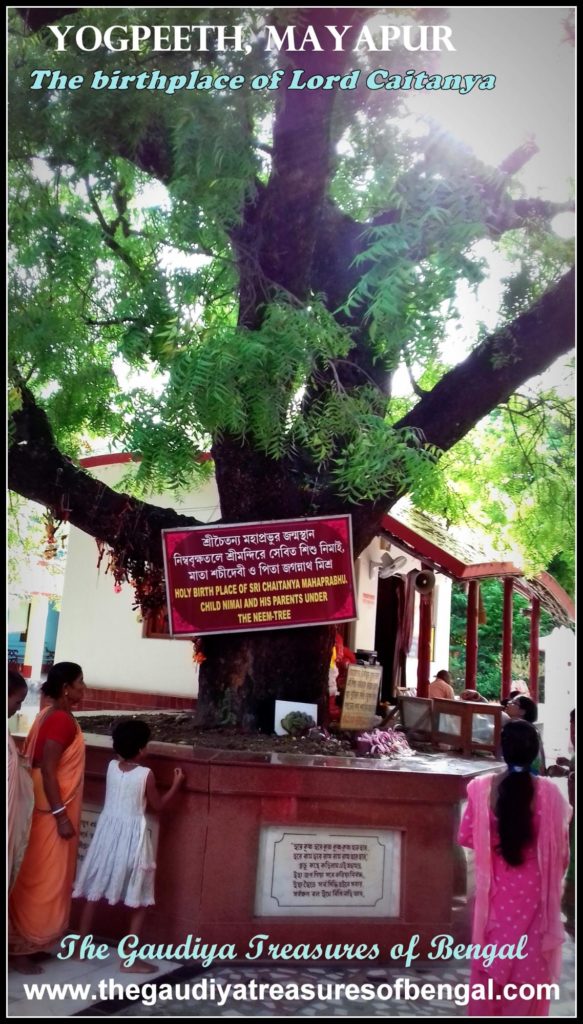
Srila Jagannatha das Babaji was the most advance rasika devotee during his times. Due to his advanced age, he could not see or walk and had to be carried within a basket by his servant from one place to another.When Srila Jagannatha das babaji was brought to Yogpeeth, he however leapt up from his basket, jumping high in the air and began to dance in an ecstasy of Gauranga prema, thereby confirming the findings of the Thakura.Srila Jagannatha Das Babaji began joyously singing – “Ei to Nimai Janmabhoomi !”(This is the Birthplace of Nimai !).Thereafter Srila Bhaktivinoda Thakura re-established this ancient site of Yogpeeth in the year 1893 AD and constructed the suitable shrines that adorn the eternal home of the Supreme Lord. Srila Bhaktivinoda Thakura used to refer Srila Jagannatha das Babaji Maharaja as Vaishnava Sarvabhauma, the “Commander-in-chief” of the Vaishnavas.
Bhaktivinoda Thakur in his last days :
Accepting the renounced order of life, Srila Bhaktivinoda accepted some disciples. One of them was Krishna das babaji who served him till his last day. He prepared his son Bimala Prasad Datta (Srila Bhaktisiddhanta Saraswati Thakura) by giving him appropriate teachings and suitable instructions.Srila Bhaktisiddhanta Saraswati (refer – ‘Sri Gaudiya Math, Baghbazar, Kolkata’) went onto become a revolutionary acharya and the founder of the worldwide Gaudiya math.Towards the later years of his life, the thakura gradually shut himself up behind the closed doors constantly meditating upon the eternal pastimes of the Lord. Feigning paralysis before the eyes of the commoners, he entered into a state of samadhi (trance). On 23rd of June, 1914, he wrapped up his earthly pastimes,entering into the Nitya lila of the Lord. This was the same day on which Srila Gadadhara pandita had disappeared from this world 400 years ago. Bhaktivinoda Thakura passed away at Bhakti Bhavan, his residence in kolkata (refer – ‘Bhakti Bhavan : Srila Bhaktivinoda Thakura’s house in Kolkata’). The remains of his spiritual body were subsequently placed into samadhi at Svananda sukhada Kunja, where he continues to rest till this day.
Suddha-bhakata-carana-renu ,
bhajana-anukula
bhakata-seva, parama siddhi,
prema-latikara mula
–
The dust of the lotus feet of pure devotees, enthusiastic favorable devotional service, and service to the pure devotees of the lord are the roots of the creeper of devotion